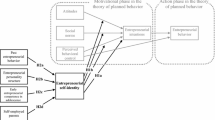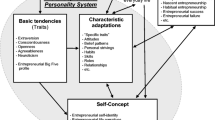Abstract
In this paper we investigate Schumpeter’s description of an entrepreneur as an actor challenging conventional wisdom to overcome social resistance and skepticism along psychological, sociological and economic dimensions. We analyze motivational and contextual predictors of intentions to become an entrepreneur within a framework based on the theory of planned behavior, social identity theory, and self-categorization theory. Relying on survey data of scientists, our analysis finds that, among those scientists who indicate entrepreneurial intentions, a rather low, but non-negligible share shows entrepreneurial intentions based on a Schumpeterian attitude – i.e., acting against all odds – whereas the rest of the potential entrepreneurs seem to choose an entrepreneurial career in order to comply with the expectations of their social environment – they seem to follow the crowd. By additionally taking into account the Five-Factor model of personality, our finding that entrepreneurial intentions are determined by cognitive and social factors rather than by basic psychological traits leaves room for policy intervention to foster technology entrepreneurship.

Similar content being viewed by others
Notes
Alternatively, we preferred a mean split over a median split of the group identification variable to produce the two groups of low and high identifies. The results remained the same.
References
Ajzen I (1991) The theory of planned behavior. Organ Behav Hum Decis Process 50:179–211
Ajzen I (2002) Construction of a standard questionnaire for the theory of planned behavior, online available: http://www-unix.oit.umass.edu/~aizen/ (10.06.2008)
Ajzen I, Fishbein M (1980) Understanding attitudes and predicting social behavior. Prentice Hall, Englewood Cliffs
Ajzen I, Madden TJ (1986) Prediction of goal-directed behavior: attitudes, intentions and perceived behavioral control. J Exp Soc Psychol 22(5):453–474
Ajzen I, Brown TC, Carvajal F (2004) Explaining the discrepancy between intentions and actions: the case of hypothetical bias in contingent valuation. Personal Soc Psychol Bull 30(9):1108–1121
Audretsch DB (2007) The entrepreneurial society. Oxford University Press, New York
Bandura A (1997) Self-efficacy: the exercise of control. W. H. Freeman, New York
Barrick MR, Mount MK, Gupta R (2003) Meta-analysis of the relationship between the five-factor model of personality and Holland's occupational types. Pers Psychol 56(1):45–74
Baum JR, Locke EA (2004) The relationship of entrepreneurial traits, skill, and motivation to subsequent venture growth. J Appl Psychol 89(4):587–598
Bercovitz J, Feldman M (2008) Academic entrepreneurs: organizational change at the individual level. Organ Sci 19(1):69–89
Bird BJ (1988) Implementing entrepreneurial ideas: the case for intention. Acad Manag Rev 13(3):442–453
Cardon MS, Wincent J, Singh J, Drnovsek M (2009) The nature and experience of entrepreneurial passion. Acad Manag Rev 34(3):511–532
Chen CC, Greene PG, Crick A (1998) Does entrepreneurial self-efficacy distinguish entrepreneurs from managers? J Bus Ventur 13(4):295–316
Cialdini RB, Reno RR, Kallgren CA (1990) A focus theory of normative conduct: recycling the concept of norms to reduce littering in public places. J Pers Soc Psychol 58(6):1015–1026
Conner M, McMillan B (1999) Interaction effects in the theory of planned behaviour: studying cannabis use. Br J Soc Psychol 38(2):195–222
Costa PT Jr, McCrae RR (1992) Revised NEO Personality Inventory (NEO PI-R) and NEO Five-Factor Inventory (NEO-FFI) professional manual. Odessa, FL
Costa PT, McCrae RR, Holland JL (1984) Personality and vocational interests in an adult sample. J Appl Psychol 69(3):390–400
Crites SL, Fabrigar LR, Petty RE (1994) Measuring the affective and cognitive properties of attitudes: conceptual and methodological issues. Personal Soc Psychol Bull 20(6):619–634
Etzkowitz H (1998) The norms of entrepreneurial science: cognitive effects of the new university–industry linkages. Res Policy 27(8):823–833
Fayolle A (2005) Evaluation of entrepreneurship education: behavior performing or intention increasing? Int J Entrep Small Bus 2(1):89–98
Fayolle A, Liñán F (2014) The future of research on entrepreneurial intentions. J Bus Res 67(5):663–666
Fielding KS, McDonald R, Louis WR (2008) Theory of planned behaviour, identity and intentions to engage in environmental activism. J Environ Psychol 28(4):318–326
Fishbein M, Ajzen I (2005) Theory-based behavior change interventions: comments on hobbis and Sutton. J Health Psychol 10(1):27–31
Fishbein M, Ajzen I (2010) Predicting and changing behavior: the reasoned action approach. Taylor, New York
Goethner M, Obschonka M, Silbereisen RK, Cantner U (2012) Scientists’transition to academic entrepreneurship: economic and psychological determinants. J Econ Psychol 33(3):628–641
Göktepe-Hulten D, Mahangaonkar P (2010) Inventing and patent activities of scientists: in the expectation of money or reputation? J Technol Transfer 35(4):401–423
Gulbrandsen M (2005) “But Peter’s in it for the money” – The liminality of entrepreneurial scientists. VEST J Sci Technol Stud 18(1–2):49–75
Hair JF, Black WC, Babin BJ, Anderson RE (2010) Multivariate data analysis: a global perspective, 7th edn. Pearson, Prentice Hall
Hardeman W, Johnston M, Johnston D, Bonetti D, Wareham N, Kinmonth AL (2002) Application of the theory of planned behaviour in behaviour change interventions: a systematic review. Psychol Health 17(2):123–158
Hogg MH, Abrams D (1988) Social identifications: a social psychology of intergroup relations and group processes. Routledge, London
Jang KL, Livesley WJ, Vemon PA (1996) Heritability of the big five personality dimensions and their facets: a twin study. J Pers 64(3):577–592
John OP, Srivastava S (1999) The big five trait taxonomy: history, measurement, and theoretical perspectives. In: Pervin LA, John OP (eds) Handbook of personality: theory and research. Guilford Press, New York, pp 102–138
Kautonen T, Gelderen M, Fink M (2015) Robustness of the theory of planned behavior in predicting entrepreneurial intentions and actions. Entrep Theory Pract 39(3):655–674
Kenney M, Goe WR (2004) The role of social embeddedness in professorial entrepreneurship: a comparison of electrical engineering and computer science at UC Berkeley and Stanford. Res Policy 33(5):691–707
Krueger NF (2007) What lies beneath? The experiential essence of entrepreneurial thinking. Entrep Theory Pract 31(1):123–138
Krueger NF (2009) Entrepreneurial intentions are dead: long live entrepreneurial intentions. In: Carsrud AL, Brännback M (eds) Understanding the entrepreneurial mind: opening the black box. Springer, New York, pp 51–72
Krueger NF, Carsrud AL (1993) Entrepreneurial intentions: applying the theory of planned behaviour. Entrep Reg Dev 5(4):315–330
Krueger NF, Reilly MD, Carsrud AL (2000) Competing models of entrepreneurial intentions. J Bus Ventur 15(5):411–432
Lahey BB (2009) Public health significance of neuroticism. Am Psychol 64(4):241–256
Lam A (2011) What motivates academic scientists to engage in research commercialization: ‘Gold’, ‘ribbon or ‘puzzle’? Res Policy 40(10):1354–1368
Landry R, Amara N, Rherrad I (2006) Why are someuniversity researchers more likely to create spin-offs than others? Evidence from Canadian universities. Res Policy 35(10):1599–1615
Lee L, Wong PK, Foo MD, Leung A (2011) Entrepreneurial intentions: the influence of organizational and individual factors. J Bus Ventur 26(1):124–136
Leskinen R (2011) Success in the female entrepreneurial networking process. Ann Innov Entrep 2(1):6002
Locke EA (2000) The prime movers: traits of great wealth creators. AMACOM, New York
Long JS (1997) Regression models for categorical and limited dependent variables. Sage Publications, Thousand Oaks
Louis KS, Blumenthal D, Gluck ME, Soto MA (1989) Entrepreneurs in academe: an exploration of behaviors among life scientists. Adm Sci Q 34(1):110–131
Lundström A, Stevenson LA (2006) Entrepreneurship policy: theory and practice. Springer, New York
Markman GD, Baron RA (2003) Person–entrepreneurship fit: why some people are more successful as entrepreneurs than others. Hum Resour Manag Rev 13(2):281–301
Markman GD, Balkin DB, Baron RA (2002) Inventors and new venture formation: the effects of general self-efficacy and regretful thinking. Entrep Theory Pract 27(2):149–165
McClelland DC (1961) The achieving society. Van Nostrand, Princeton
Murray F, Graham L (2007) Buying science and selling science: gender differences in the market for commercial science. Ind Corp Chang 16(4):657–689
O’Gorman C, Byrne O, Pandya D (2008) How scientists commercialise new knowledge via entrepreneurship. J Technol Transfer 33(1):23–43
Obschonka M, Silbereisen RK, Schmitt-Rodermund E (2010) Entrepreneurial intention as developmental outcome. J Vocat Behav 77(1):63–72
Obschonka M, Goethner M, Silbereisen RK, Cantner U (2012) Social identity and the transition to entrepreneurship: the role of group identification with workplace peers. J Vocat Behav 80(1):137–147
OECD (2003) Turning science into business. OECD, Paris
Ostendorf E (1990) Sprache und Persönlichkeitsstruktur: Zur Validität des Fünf-Faktoren-Modells der Persönlichkeit [language and personality structure: toward the validation of the five-factor model of personality]. Regensburg, Germany: S. Roeder Verlag
Owen-Smith J, Powell W (2001) Careers and contradictions: faculty responses to the transformation of knowledge and its uses in the life sciences. Res Sociol Work 10:109–140
Perkmann M, Tartari V, McKelvey M, Autio E, Broström A, D’Este P, Fini R, Geuna A, Grimaldi R, Hughes A, Krabel S, Kitson M, Llerena P, Lissoni F, Salter A, Sobrero M (2013) Academic engagement and commercialisation: a review of the literature on university–industry relations. Res Policy 42(2):423–442
Rahm D (1994) Academic perceptions of university–firm technology transfer. Policy Stud J 22(2):267–278
Rauch A, Frese M (2007) Born to be an entrepreneur? Revisiting the personality approach to entrepreneurship. In: Baum JR, Frese M, Baron RA (eds) The psychology of entrepreneurship. Erlbaum, Mahwah, pp 41–65
Rothaermel FT, Agung SD, Jiang L (2007) University entrepreneurship: a taxonomy of the literature. Ind Corp Chang 16(4):691–791
Schmitt-Rodermund E (2004) Pathways to successful entrepreneurship: parenting, personality, early entrepreneurial competence, and interests. J Vocat Behav 65(3):498–518
Schmitt-Rodermund E (2007) The long way to entrepreneurship: personality, parenting, early interests, and competencies as precursors for entrepreneurial activity among the ‘Termites’. In: Silbereisen RK, Lerner RM (eds) Approaches to positive youth development. Sage, London, pp 205–224
Schumpeter JA (1934) The theory of economic development. Oxford University Press, London
Schumpeter JA (2002) New translations: theorie der wirtschaftlichen entwicklung. Am J Econ Sociol 61(2):405–437 (originally published in 1911)
Shane SA (2004) Academic entrepreneurship: university spinoffs and wealth creation. Edward Elgar Publishing, Cheltenham
Shaver KG, Scott LR (1991) Person, process, choice: the psychology of new venture creation. Entrep Theory Pract 16(2):23–45
Silbereisen RK (2005) Presidential address. Social change und human development: experiences from German unification. Int J Behav Dev 29(1):2–13
Singh G, DeNoble AF (2003) Views on self-employment and personality: an exploratory study. J Dev Entrep 8(3):265–281
Smilor RW (1997) Entrepreneurship: reflections on a subversive activity. J Bus Ventur 12(5):341–346
Souitaris V, Zerbinati S, Al-Laham A (2007) Do entrepreneurship programmes raise entrepreneurial intention of science and engineering students? The effect of learning, inspiration and resources. J Bus Ventur 22(4):566–591
Statistisches Bundesamt (2008) Bildung und kultur: personal an hochschulen [education and culture: personell at universities]. Statistisches Bundesamt, Wiesbaden
Stuart TE, Ding WW (2006) When do scientists become entrepreneurs? The social structural antecedents of commercial activity in the academic life sciences. Am J Sociol 112(1):97–144
Tajfel H, Turner JC (1979) An integrative theory of intergroup conflict. In: Austin WG, Worchel S (eds) The social psychology of intergroup relations. Brooks-Cole, Monterey, pp 33–47
Terry DJ, Hogg MA (1996) Group norms and the attitude-behavior relationship: A role for group identification. Personal Soc Psychol Bull 22(8):776–793
Terry DJ, Hogg MA, White KM (1999) The theory of planned behaviour: self‐identity, social identity and group norms. Br J Soc Psychol 38(3):225–244
Turner JC, Hogg MA, Oakes PJ, Reicher SD, Wetherell MS (1987) Rediscovering the social group: a self-categorization theory. Oxford, UK: Basil Blackwell
Wang JH, Chang CC, Yao SN, Liang C (2015) The contribution of self-efficacy to the relationship between personality traits and entrepreneurial intention. High Educ 1–16.
Zhao H, Seibert SE (2006) The Big five personality dimensions and entrepreneurial status: a meta-analytical review. J Appl Psychol 91(2):259–271
Zhao H, Seibert SE, Lumpkin GT (2009) The relationship of personality to entrepreneurial intentions and performance: a meta-analytic review. J Manag 36(2):381–404
Acknowledgments
Financial support by the Thuringian Ministry of Education (Thüringer Kultusministerium) and the Hans-Böckler-Stiftung within the research project “Success and Failure of Innovative Start-Ups – A Process-Oriented Analysis of Economic and Psychological Determinants” is gratefully acknowledged. Maximilian Goethner thanks the German Science Foundation for financial support with the doctoral program DFG-GRK 1411 “The Economics of Innovative Change”. We thank the participants of the SCHUMPETER AND SCHUMPETERIANS ON ECONOMIC POLICY ISSUES - 80 years after the publication of the Theory of Economic Development (1934), held at the Université de Picardie – Jules Vernes, Amiens, May 19–20, 2014, for their valuable comments and suggestions, especially Emmanuelle Fauchart, the official discussant. We also thank two anonymous reviewers of the journal for their advice and the editors of this special issue for the careful editing. Charles McCann did a magnificent job in getting the English right. The usual caveats apply.
Author information
Authors and Affiliations
Corresponding author
Ethics declarations
Funding
This study has received funding as stated in the editorial management system.
Conflict of interest
The authors declare that they have no conflict of interest.
Rights and permissions
About this article
Cite this article
Cantner, U., Goethner, M. & Silbereisen, R.K. Schumpeter’s entrepreneur – A rare case. J Evol Econ 27, 187–214 (2017). https://doi.org/10.1007/s00191-016-0467-3
Published:
Issue Date:
DOI: https://doi.org/10.1007/s00191-016-0467-3
Keywords
- Schumpeterian entrepreneur
- Academic entrepreneurship
- Entrepreneurial intentions
- Theory of planned behavior
- Five-Factor personality traits




